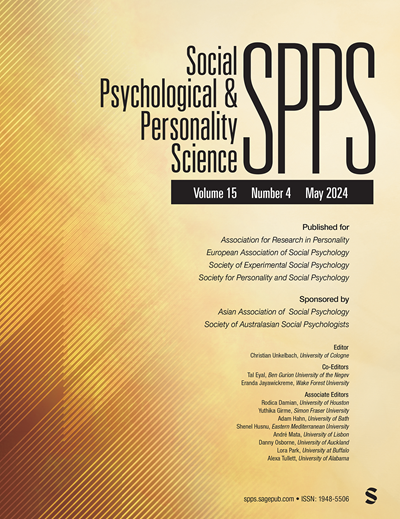Perceived Inequality Increases Support for Structural Solutions to Climate Change
IF 3.3
2区 心理学
Q1 PSYCHOLOGY, SOCIAL
引用次数: 1
Abstract
Economic inequality is fuelling climate change. The question, however, remains whether the degree to which people perceive their country as unequal influences their motivation to support climate policies. Across three studies ( N = 1,459), we investigated whether perceived inequality influences people’s support for structural climate policies over policies aimed at individual-level behavior change. In an Australian (Study 1) and a United Kingdom (Study 2) sample, we found that perceived inequality positively predicts people’s support for structural (vs. individual-level behavior) change policies, even after controlling for political orientation. In an experimental study (Study 3), people who imagined living in an unequal (vs. equal) country more strongly wanted their country to implement structural (vs. individual-level behavior) change policies. These effects were mediated by a greater desire for drastic changes. This suggests that recognizing one’s country’s unequal wealth distribution may act as a catalyst for the structural change urgently needed to limit climate change.感知到的不平等增加了对气候变化结构性解决方案的支持
经济不平等正在加剧气候变化。然而,问题仍然是,人们认为自己国家不平等的程度是否会影响他们支持气候政策的动机。在三项研究中(N = 1459),我们调查了感知到的不平等是否会影响人们对结构性气候政策的支持,而不是旨在改变个人行为的政策。在澳大利亚(研究1)和英国(研究2)的样本中,我们发现,即使在控制了政治取向之后,感知到的不平等也能积极预测人们对结构性(相对于个人层面的行为)改变政策的支持。在一项实验研究(研究3)中,想象生活在不平等(与平等)国家的人更强烈地希望他们的国家实施结构性(与个人层面的行为)改变政策。对剧烈变化的更大渴望缓和了这些影响。这表明,认识到一个国家的不平等财富分配,可能会成为限制气候变化迫切需要的结构性变革的催化剂。
本文章由计算机程序翻译,如有差异,请以英文原文为准。
求助全文
约1分钟内获得全文
求助全文
来源期刊

Social Psychological and Personality Science
PSYCHOLOGY, SOCIAL-
CiteScore
12.50
自引率
1.80%
发文量
77
期刊介绍:
Social Psychological and Personality Science (SPPS) is a distinctive journal in the fields of social and personality psychology that focuses on publishing brief empirical study reports, typically limited to 5000 words. The journal's mission is to disseminate research that significantly contributes to the advancement of social psychological and personality science. It welcomes submissions that introduce new theories, present empirical data, propose innovative methods, or offer a combination of these elements. SPPS also places a high value on replication studies, giving them serious consideration regardless of whether they confirm or challenge the original findings, with a particular emphasis on replications of studies initially published in SPPS. The journal is committed to a rapid review and publication process, ensuring that research can swiftly enter the scientific discourse and become an integral part of ongoing academic conversations.
 求助内容:
求助内容: 应助结果提醒方式:
应助结果提醒方式:


